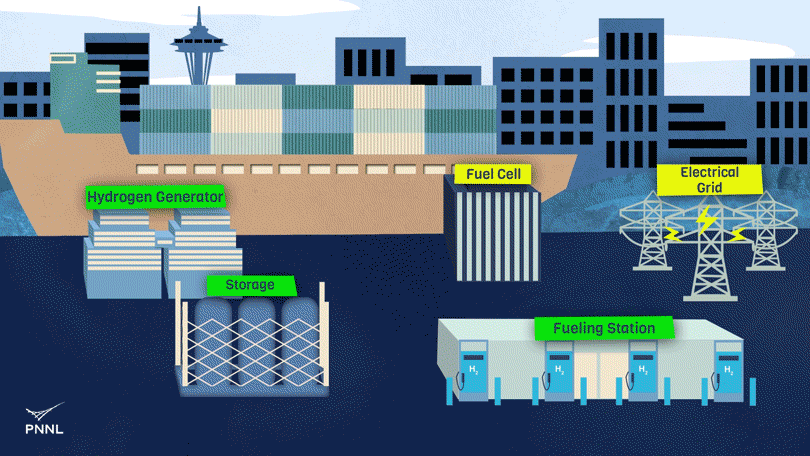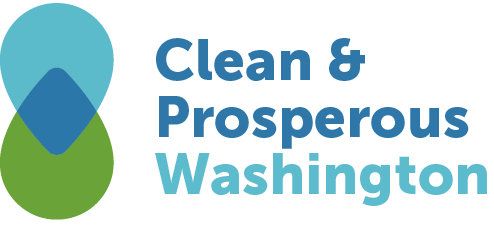Washington Wins!
“Washington Wins!” is a headline that may be bannered tomorrow in purple & gold in Montlake, and in crimson & gray in Pullman. But today’s “Washington Wins!” headline is bright green, in celebration of Green Hydrogen.
Today President Biden announced that the United States Department of Energy (DOE) selected the Pacific Northwest Hydrogen Association’s PNWH2 Hub for award negotiations as one of the Regional Clean Hydrogen Hubs following a competitive nationwide process. Washington, Oregon and Montana will receive $1 billion to establish eight hydrogen production sites across the three states.

President Joe Biden arrives to speak at Tioga Marine Terminal, Friday, Oct. 13, 2023, in Philadelphia. (AP Photo/Evan Vucci)
The Biden Administration touts the program as one of the biggest investments ever in U.S. clean manufacturing. The grants are expected to leverage over $40 billion in private investment.
Last year the DOE announced that funding from the Bipartisan Infrastructure Law would make $7 billion available for the establishment of up to ten “Hydrogen Hubs” (H2H) in strategic locations around the country. Applications were invited, and about 80 applicants entered the competition.
Washington state passed legislation (Senate Bill 5910) to support the PNW application with funding from the Climate Commitment Act – According to former State Senator (and Clean & Prosperous Board member) Reuven Carlyle, “It was the only bill in the U.S. of its kind.”
Governor Inslee underscored how the unique strengths of Washington state helped secure the PNWH2 Hub, saying “Washington state and our many partners in this effort got here today because we have the commitment to innovation, nation-leading climate policies and economic bona fides to build even more clean energy resources here in Washington. This hub will be another example that the transition to all renewable energy is not only saving our planet but contributing to robust economic growth. The projects in this hub will support thousands of new jobs in Washington and the Northwest, while slashing emissions in sectors such as heavy-duty transportation, maritime, agriculture, and industrial operations.”

Image from pnwh2.com
Partners in the PNW effort include state and local governments, as well as Amazon, bp America, the Cowlitz Indian Tribe, First Mode, Fortescue Future Industries, Northwest Seaport Alliance, PACCAR, Puget Sound Energy, several labor unions, and others.
Representatives from several of these organizations traveled to Quebec in May, on the Clean & Prosperous Institute Study Mission that included a visit to Harnois Energie’s hydrogen production and fueling facility in Quebec City.
DOE’s Pacific Northwest National Laboratory (PNNL) is lending its expertise across several fields of study. PNNL experts are also providing economic analyses and evaluations of hydrogen production, integration with the electrical grid, and other areas as the region builds out a clean hydrogen economy.

Researchers at Pacific Northwest National Laboratory have been studying how hydrogen can decarbonize the heavy-duty transportation sector. Now, a new Pacific Northwest Hydrogen Hub will take the next step toward integrating hydrogen into the region’s energy future. (Animation by Sara Levine | Pacific Northwest National Laboratory)
The proposed PNW sites include Bellingham, Centralia, East Wenatchee and Kennewick in Washington; Portland, Boardman and Baker City in Oregon; and St. Regis in Montana.
The Centralia site demonstrates how our state is transitioning from the fossil-fueled past to the clean energy future, with public funding priming the pump for massive private investment. Australia’s Fortescue Future Industries will build a green hydrogen plant on the site of the former TransAlta coal plant.
According to the Pacific Northwest Hydrogen Association,
DOE’s H2Hubs will kickstart a national network of clean hydrogen producers, consumers, and connective infrastructure while supporting the production, storage, delivery, and end-use of clean hydrogen. Funded by President Biden’s Investing in America agenda, the H2Hubs will accelerate the commercial-scale deployment of clean hydrogen—helping generate clean, dispatchable power, create a new form of energy storage, and decarbonize heavy industry and transportation. Together, they will also reduce 25 million metric tons of carbon dioxide emissions from end-uses each year—an amount roughly equivalent to combined annual emissions of 5.5 million gasoline-powered cars—and create tens of thousands of good-paying jobs across the country while supporting healthier communities and strengthening America’s energy security.
The PNWH2 Hub will leverage the abundant clean power and innovative technology companies in the Pacific Northwest to accelerate the transition to clean hydrogen production and use. The hub will focus on decarbonizing the region’s hard-to-electrify heavy-duty transportation, long-duration energy storage, ports, agriculture and industrial operations.
The hub’s projects will drive economic opportunity across all demographics, creating or supporting more than 10,000 good-paying jobs and stronger energy security to improve the lives and futures of people throughout the region. The hub vision and projects were developed with leadership from tribes, unions, industry and many others and will help deliver a shared vision of clean and equitable energy systems in the Pacific Northwest.
The PNWH2 Hub is eligible to receive up to $1 billion in federal funding over four DOE-defined development phases spanning nine years, with $20 million allocated for Phase 1. DOE will evaluate the hub’s activities and deliver go/no-go decisions at each phase.
The Pacific Northwest Hydrogen Association is a multi-state nonprofit coalition of public and private partners spanning Washington, Oregon and Montana. The coalition includes representatives from Tribal Nations, labor, business and industry, higher education, government and the environmental community.
For more information and updates on the Pacific Northwest Hydrogen Association, visit https://pnwh2.com.
With today’s big win, the Evergreen State is greener than ever.

